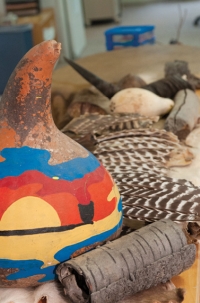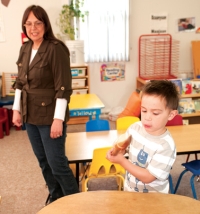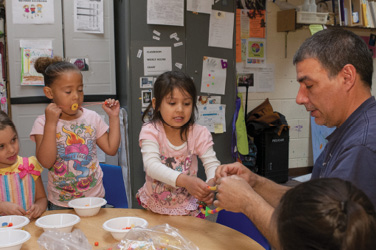Conducting Research in Diverse Communities: Wiba Anung (Early Star)

Classroom display by Little Traverse Bay Band of Odawa Indians in Pellston, Michigan.
It is widely acknowledged that American Indian children and their families face obstacles that impact educational goals. Early childhood education programs can introduce children and their families to a journey that prepares preschoolers for future social and academic success.
Michigan State University, the Inter-Tribal Council of Michigan, Bay Mills Community College, and 11 Michigan tribes have created a sustaining partnership that focuses on improving outcomes for children enrolled in Michigan-based American Indian Head Start/Early Head Start (HS/EHS) programs.
The idea began in 2005 with a meeting between Hiram Fitzgerald, associate provost for University Outreach and Engagement (UOE), and Ann Belleau (Ojibwe), Head Start director for the Inter-Tribal Council of Michigan (ITC Michigan). They met at the American Indian/Alaska Native Head Start Research Center (AI/AN HSRC), which is located at the University of Colorado – Denver and funded by the U.S. Department of Health and Human Services' Administration for Children and Families. Both were invited to join the steering committee of the AI/AN HSRC, whose members were charged with designing a national study that could help create more effective American Indian/Alaska Native Tribal Head Start programs.
AI/AN HSRC steering committee members determined that several critical issues needed to be addressed before a national study could be designed and proposed three key aspects of systems change:
- Enhance the qualifications and skills of Head Start teachers
- Build more effective cultural competency skills for nontribal Head Start teachers
- Infuse culturally appropriate components into existing curricula being used in AI/AN Head Start programs
The federal Administration for Children and Families then highlighted nine core areas for potential funding that would address those critical issues so that work on a national study could begin.
Fitzgerald and Belleau assembled a Michigan team that participated in a joint submission for one of the federal grants focused on professional development for teachers. They believed this focus had the potential to enhance positive outcomes for children, particularly with respect to their academic and behavioral school readiness skills.
University-Community Collaboration

Head Start services are designed to be responsive to each child and family's ethnic, cultural, and linguistic heritage.
Belleau and Fitzgerald approached leaders of ITC Michigan to discuss AI/AN HSRC steering committee recommendations and to propose what eventually became the Wiba Anung collaboration.
The Inter-Tribal Council of Michigan, Inc. Head Start Program is a nonprofit organization and consortium of Michigan's federally recognized tribes. According to the mission statement, "The ITC HS/EHS programs are dedicated to providing and advocating for quality services through a holistic approach of developmentally appropriate, family-centered, and culturally relevant services to promote strong healthy families." HS/EHS director Belleau has advocated for effective data use to identify strengths and gaps in early education for Michigan American Indian children and their families.
"What we knew in forming the partnership was that research, training, and information gathering were essential for identifying strengths in our program, as well as areas of concern," said Belleau.
MSU leadership is provided by Fitzgerald and Jessica V. Barnes-Najor, associate director of the Community Evaluation and Research Collaborative (CERC) in UOE. Patricia Farrell (Taos Pueblo), assistant provost emeritus and initial collaborator, continues involvement as time permits.
Hope Gerde, associate professor in the Department of Human Development and Family Studies, is an early childhood specialist participating in the project. Her research focuses on how teachers' classroom practice supports children's development during preschool and how well-designed professional development opportunities can enhance teachers' interactions with children. KyungSook Lee, postdoctoral research associate from CERC, provides critical input for statistical analyses of Wiba Anung data.
The Wiba Anung partnership involves expertise and collaborative efforts from a wide range of participants. In addition to the member tribes of ITC Michigan, community participants include parents, Head Start directors and staff, and tribal elders.
Systemic Engagement and Systemic Approaches to Community Change
What is noteworthy about the Wiba Anung partnership is the collaborative involvement between university and community participants working together to co-create an organizational design based on a systemic approach to community change. "Inclusion involved creating a research team with individuals drawn from all components of our theory of change," said Fitzgerald.
One of the more immediate impacts of the process in 2005-2006 was the dialogue between university and community participants that led to the partnership's name change from "Building Teacher Capacity in American Indian Head Start and Early Head Start Programs in Michigan," to "Wiba Anung (Early Star): Promoting Academic and Social Success in Michigan Tribal Head Start Programs." The name change shifted project emphasis onto tribal assets as the basis for building systems change, created better balance, and focused efforts on changes in children as the key outcome1.

Head Start classroom project underway with students from the Nottawaseppi Huron Band of Potawatomi in Grand Rapids, Michigan.
"Capacity building, understanding needs, and co-designing a plan to meet the needs are the core fundamentals of Wiba Anung, as well as the way we approach all university-community partnerships at MSU," said Barnes-Najor.
A 25-person Wiba Anung Research Advisory Team was assembled early in the project, consisting primarily of tribal members who oversaw all facets of program development and policy recommendations. There was also a Research Advisory Team, a Cultural Competence Advisory Team, and a Core Research Team.
Parents, Head Start directors, teachers, community members, and university researchers on the Tribal Partnership Team continue to participate in all aspects of proposed work and to jointly assess, prioritize, and address community needs and desired outcomes.
It was recommended that university researchers, students, and staff working with the Wiba Anung project also become familiar with the culture and inculcate cultural understanding into their scholarly products. Emphasis was placed on face-to-face interactions and meetings to facilitate communication and gain understanding about how the partners would work together to plan and accomplish the goals of the project.
In 2015 the administrative project model has evolved into three types of teams: the Tribal Partnership Team, including community and research partners who have an interest in working to address issues regarding early childhood education in tribal communities; the Leadership Team, consisting of a small group of researchers and community partners who meet a minimum of monthly (and as frequently as weekly) via conference call to make decisions about the overall direction of the partnership; and Communities of Learning, consisting of smaller teams of researchers and community partners who meet monthly, virtually, or in person, to move forward on a particular strand of inquiry2.
Teacher Education and Professional Development
An immediate fact before the group was the low percentage of teachers with degrees in migrant or AI/AN Head Start/Early Head Start programs. There are national discrepancies between desired teacher educational degrees and tribal teachers with educational degrees. Reasons for this gap exist because of traditionally low pay for HS/EHS teachers; working teachers typically pursue degrees on a part-time basis either long distance or online, and they often have families of their own that increase their obligations of both time and resources.
In addition to boosting teacher education, goals were set to institute a professional development program designed to enhance teachers' classroom practices. In 2014, under Hope Gerde's leadership, MSU approved an agreement that enables any student graduating with an associate's degree to enter the early childhood education program with junior status at MSU, providing all core requirements for admission are met.
Cultural Awareness
Initial partnership meetings determined early on that inclusion of Native language and culture in the Head Start classrooms was important to parents, community participants, and tribal leaders. Discussions about cultural skills, values, beliefs, and ways of life, as well as tribal language, are regarded as an integral part of home and community. Effective teacher-child interaction in Head Start classrooms is built on fundamental inclusion, education, and cultural awareness.
One acknowledged gap exists because there are not enough teachers or adults who speak tribal languages, and community participants agreed that it was part of the effort that needs support from everyone involved.
Curriculum and Infusion of Cultural Components
The first two years of the partnership emphasized building trust among the university researchers, tribal members, parents, and HS/EHS administrators, teachers, and staff.
Seven focus group sessions included parents and education professionals. These sessions provided an opportunity to learn about perceptions of the role of formal education in the children's lives, parent perspectives on the current structure of education and the educators involved with their children's learning, and their views on incorporating cultural components into formal education.
The focus group findings suggested that some cultural additions, such as the custom of wintertime storytelling that tribal elders have passed along to younger generations for centuries, could integrate seamlessly into Head Start curriculum.
They also revealed deep concerns about the impact of racism and microagression on the quality of education their children experience.
Assessments and Results
"MSU is an amazing partner. The formal funding source is complete, but the work is still moving on and the continual dialogue is strong. We understand how to engage in a research partnership because of our work together. We value the systems in place that advance our capacity to collect and utilize data for a more effective Head Start program."
Ann Belleau
Head Start Director, Inter-Tribal Council of Michigan
The steering committee co-developed a child and classroom assessment aimed at strengthening the education supports provided by tribal Head Start programs. The assessments are conducted each academic year in the fall and spring.
The primary goals of the assessment are to understand the quality of the classroom environment; the preschoolers' social, emotional, and academic development; and the educational supports provided by families.
The data collected to date indicate a great need to improve children's opportunities to develop literacy and numeracy skills3.
In a 2010 abstract describing the project for the national C. Peter Magrath Community Engagement Scholarship Award, Gerde said, "Using a community-based participatory research approach meant that community members informed the research design, selection of measures, and research priorities."
Dr. Gerde and the MSU team trained a team of community members in the standardized assessment of young children and classroom observation coding systems to collect the outcome data. This has resulted in the development of a longitudinal database of parent, teacher, and child outcome data that can track cognitive, social, and language skills across preschool children in the American Indian Head Start programs and be matched against national Head Start data.
"The Wiba Anung partnership employs a multi-contextual theory of change, emphasizing the importance of home, community, and school in the successful development of children. We used a community-based participatory research methodology to co-create a preventive-intervention plan for systems change," said Gerde.
The system is now in place to document issues beginning at the student level, and can follow that data through to classroom, then to center, then to program levels. This means that data, trends, and themes can be utilized effectively to create individualized plans for students, as well as to reinforce teachers, staff, administrators, and parents as preschoolers experience Head Start education.
In the first three years, the co-designed training to collect data was led by MSU researchers; for the past six years the ITC Michigan partners have assumed leadership of data collection.
Belleau continues the work from her Sault Saint Marie office in Michigan's Upper Peninsula. "Together we have created a comprehensive process that boosts our ability to collect and examine data at multiple points—student, classroom, Head Start center, or overall program levels," she said.
A Sustaining Partnership
The evolving partnership has deepened beyond expectations. It has led those involved from the tribal community to identify as a more joined community, working collaboratively on projects and goals pertaining to curriculum development, program expansions, professional development for staff, parent-child dynamics, and parental involvement.
Wiba Anung Collaborators
- Inter-Tribal Council of Michigan, Inc. Head Start Program
- Sault Ste. Marie Tribe of Chippewa Indians Head Start Program
- Grand Traverse Band of Ottawa and Chippewa Indians Head Start Program
- American Indian/Alaska Native Head Start Research Center (AI/AN HSRC)
- American Indian/Alaska Native Tribal Head Start programs
- Bay Mills Community College
- MSU Office of the Associate Provost for University Outreach and Engagement
- MSU Department of Human Development and Family Studies
- Contributing expertise from MSU faculty and staff from the departments of Psychology, Kinesiology, and Anthropology; and from the colleges of Education, Engineering, Human Medicine, Nursing, and Social Science
Sources
- Fitzgerald, H. E., Farrell, P. (Taos Peublo), Barnes, J. V., Belleau, A. (Ojibwe), Thompson, N. L. (Mohican), Lee, K., Calcatera, M. (Sault Saint Marie Ojibwe), & Parish, A. (Ojibwe). (2013). Wiba Anung: Co-creating a sustainable partnership with Michigan's American Indian Head Start programs. In H. E. Fitzgerald & J. Primavera (Eds.), Going public: Civic and community engagement (pp. 137-161). East Lansing: Michigan State University Press.Return to text
- McNall, M., Barnes-Najor, J. V., Brown, R. E., Doberneck, D., & Fitzgerald, H. E. (2015). Systemic engagement: Universities as partners in systemic approaches to community change. Journal of Higher Education Outreach and Engagement, 19, 1-25.Return to text
- Barnes, J. V., Gerde, H., Farrell, P. A., Lee, K.-S., Fitzgerald, H. E., & Belleau, A. (2010). Figure 1. Children's Academic Readiness in Year 1. In Improving Children's Academic Readiness Through High Quality Tribal Head Start Programs (poster presentation).Return to text
- Written by Carla Hills, University Outreach and Engagement